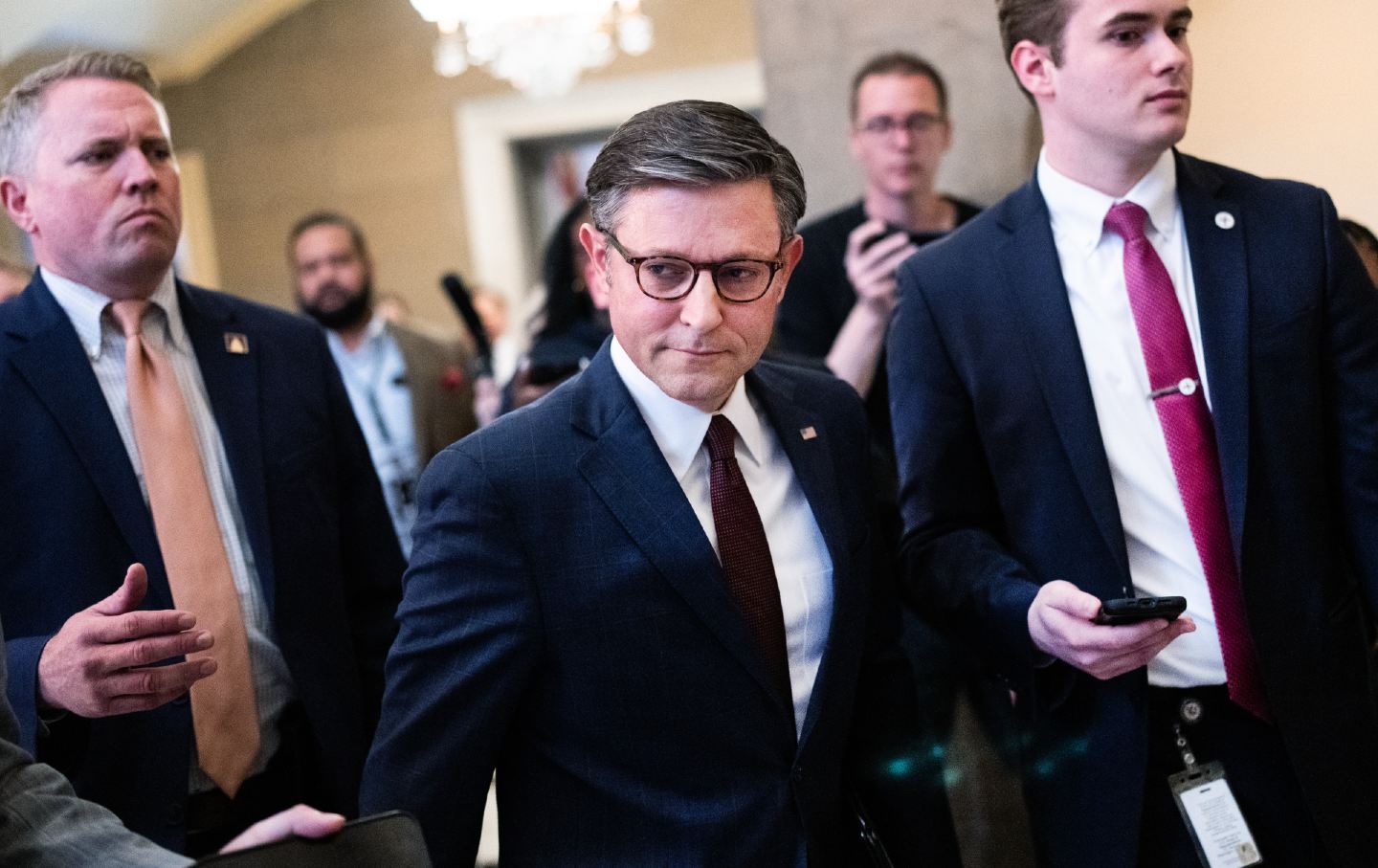The Ukraine Aid Package Heightens the Risk of Escalation
The passage by Congress of the latest aid package to Ukraine was met with cheers, but there is ample reason for caution.

Last week’s passage of the Ukraine aid package by both the House and the Senate showed if nothing else that bipartisanship—at least on matters of foreign policy—remains alive and well in Washington, with leading Democratic progressives joining Republican hawks to pass the $61 billion package.
Mark Green, a former four-term Democratic congressman from Wisconsin, and current head of the Wilson Center, captured the current D.C. zeitgeist well, writing that “moments like the final passage of this assistance package show the world that, just as America never turns its back on key allies and important challenges, they should never fully count us out.”
Yet, despite the torrent of self-congratulation, concerning details surfaced soon after the House vote—not least what appears to be the Biden administration’s likely use of questionable, highly subjective intelligence to win over Republican Speaker Mike Johnson.
Multiple mainstream media outlets report that the Biden administration arranged several multiple “high-level” intelligence briefings for the speaker. According to Politico’s Jonathan Martin, “It only took a higher level of intelligence briefings, granted to congressional leaders, for [Johnson] to pick up that old Cold War hymnal.” Martin noticed that, after having received briefings by the US Intelligence Community, several members of Congress, including Johson, House majority leader Steve Scalise, House foreign affairs committee chair Michael McCaul, and Representative Brian Fitzpatrick were all using the phrase “axis of evil” to refer to Russia, Iran, and China. As McCaul put it, “They’re all related, man…. To abandon Ukraine will only invite more aggression from Putin but also Chairman Xi in Taiwan. The ayatollah has already reared his ugly head.”
Where did this language come from, asked Martin?
“Spend an hour in the SCIF getting briefed,” Fitzpatrick shot back, referring to the secure facility used for classified briefings. “These are not isolated problems.”
After the vote, Johnson told Bloomberg, “I really do believe the intel and the briefings that we got…. I think Vladimir Putin would continue to march through Europe if he were allowed.”
If the US IC is putting forward cherry-picked conjecture (“Putin will march through Europe”) as fact, then don’t we once again have to confront the specter of politicized intelligence?
More worrying still, reporting on the aid package shows that the president and his staff have been serially misleading the public about what exactly US forces have been up to in Ukraine. Politico reported last week that “the administration secretly sent long-range [ATACMS] missiles to Ukraine for the first time in the war—and Kyiv has already used them twice to strike far behind Russian lines.” If true, this would contradict the president’s public assurances that (a) his administration would not send ATACMS to Ukraine, and (b) the US would not, due to the risks, countenance direct attacks on Russia.
Meanwhile, The Washington Post’s Karen DeYoung indicates that “scores of images recently leaked online, many with classified US military and intelligence assessments, illustrate how deeply the United States is involved in virtually every aspect of the war, with the exception of US boots on the ground.”
All of which raises the question: What else are they not telling us?
One important consideration—but one that remains notable for its absence in the coverage of the war—involves the risks of escalation. Professor Lyle Goldstein, who for 20 years taught at the Naval War College, has written about what he calls the “nuclear paradox”—that is, “if the US and NATO increase their military spending and conventional forces in Europe, the weakness of Russian conventional military forces could prompt Moscow to rely more heavily on its nuclear forces.”
Ignoring such risks, supporters of the aid package have instead cited it as a boon to the US economy. Yet, besides being morally grotesque, lining the pockets of defense industry behemoths like Raytheon and Lockheed Martin at the cost of hundreds of thousands of dead Ukrainian and Russian soldiers will do little to further the president’s campaign pledge to “build back better.”
Still more, the animating idea behind the aid package— that it helps Ukraine live to fight another day—is deeply misguided. It would be hard to improve upon the formulation of George Beebe, former CIA head of Russia analysis and director of the Quincy Institute’s Grand Strategy Program, that, if Washington “were intentionally to design a formula for Ukraine’s destruction, it might look a lot like the aid package passed by Congress this week.” At this late date, better and more weapons and ordnance will not carry the day—and they will certainly not in the absence of a Ukrainian Army able to deploy them. Recent reporting by BBC Ukraine indicates that 650,000 military-age men have fled the country.
Popular
“swipe left below to view more authors”Swipe →Too often missing from the conversation is the humanitarian toll the war has taken on Ukraine. Estimates show that between 2021 and 2023, Ukraine’s GDP has shrunk by nearly 30 percent, with millions out of work. The Economist predicts that the country will need $37 billion in external financing in 2024. In short, there has to be a better way than prolonging the suffering in order to ward off the phantom of never-ending Russian expansion—after all, Putin’s military tried and failed to cross the Dnieper and take Kiev only two years ago. The idea that Ukraine is but a first step in Putin’s plans to retake Eastern Europe, while popular, simply overestimates Russian strength while ignoring the root cause of the current conflict. Wiser heads (if they indeed exist) in Washington might use the opportunity provided by the Ukraine Recovery Conference this June in Berlin to reassess our priorities.
The answer to war is not more war. A negotiated end to the cruel conflict will require hard choices and painful trade-offs. But the sooner it is done, the sooner Ukraine’s reconstruction, reconciliation, and entry into Europe can and should begin.
Thank you for reading The Nation!
We hope you enjoyed the story you just read, just one of the many incisive, deeply reported articles we publish daily. Now more than ever, we need fearless journalism that moves the needle on important issues, uncovers malfeasance and corruption, and uplifts voices and perspectives that often go unheard in mainstream media.
Donate right now and help us hold the powerful accountable, shine a light on issues that would otherwise be swept under the rug, and build a more just and equitable future.
For nearly 160 years, The Nation has stood for truth, justice, and moral clarity. As a reader-supported publication, we are not beholden to the whims of advertisers or a corporate owner. But it does take financial resources to report on stories that may take weeks or months to investigate, thoroughly edit and fact-check articles, and get our stories to readers like you.
Donate today and stand with us for a better future. Thank you for being a supporter of independent journalism.
Thank you for your generosity.
More from The Nation

In Nepal’s Mustang Region, Climate “Loss and Damage” Puts the Survival of a Tibetan Community in Question In Nepal’s Mustang Region, Climate “Loss and Damage” Puts the Survival of a Tibetan Community in Question
What climate change looks and feels like in the Himalayas.

The Dubious Land Deal Threatening East Jerusalem’s Armenian Quarter The Dubious Land Deal Threatening East Jerusalem’s Armenian Quarter
In April 2023, the community learned that an Israeli real estate company would soon construct a hotel on one-fourth of their land. “Progressively, we will lose everything.”

The Invisible Lives of Israel’s Thai Workforce The Invisible Lives of Israel’s Thai Workforce
Manee Jirchat was one of the 31 Thai laborers kidnapped by Hamas on October 7. This is his story.

Who’s Afraid of the International Criminal Court? Who’s Afraid of the International Criminal Court?
In two decades, the ICC has never indicted a Western official. But a warrant may be coming for Benjamin Netanyahu.

Rafah Is in Panic as the Israeli Invasion Begins Rafah Is in Panic as the Israeli Invasion Begins
With Israeli forces entering Gaza’s southernmost city, scenes from the Nakba are being repeated in the strip’s last refuge.

Local Elections in Britain Put the Labour Party’s Stance on Gaza Under the Spotlight Local Elections in Britain Put the Labour Party’s Stance on Gaza Under the Spotlight
Labour leader Keir Starmer is favored to win the UK’s general election later this year, but—as with Joe Biden—there is one word that could derail his campaign: Gaza.


